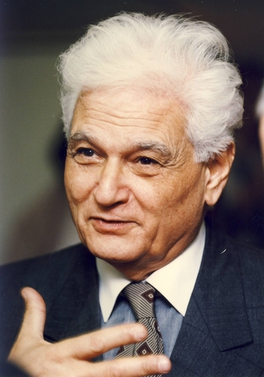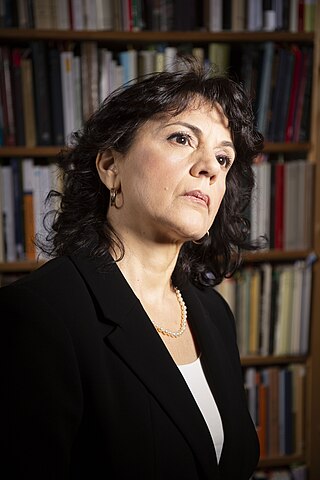Related Research Articles

Hans-Georg Gadamer was a German philosopher of the continental tradition, best known for his 1960 magnum opus, Truth and Method, on hermeneutics.

Jürgen Habermas is a German philosopher and social theorist in the tradition of critical theory and pragmatism. His work addresses communicative rationality and the public sphere.

Ludwig Josef Johann Wittgenstein was an Austrian philosopher who worked primarily in logic, the philosophy of mathematics, the philosophy of mind, and the philosophy of language. He is considered by some to be the greatest philosopher of the 20th century.

In metaphysics, ontology is the philosophical study of being, as well as related concepts such as existence, becoming, and reality.

Plato was an ancient Greek philosopher born in Athens during the Classical period in Ancient Greece. In Athens, Plato founded the Academy, a philosophical school where he taught the philosophical doctrines that would later become known as Platonism. Plato was a pen name derived, apparently, from the nickname given to him by his wrestling coach – allegedly a reference to his physical broadness. According to Alexander of Miletus quoted by Diogenes of Sinope his actual name was Aristocles, son of Ariston, of the deme Collytus.
Postmodernism is an intellectual stance or mode of discourse characterized by skepticism toward the "grand narratives" of modernism; rejection of epistemic certainty or the stability of meaning; and sensitivity to the role of ideology in maintaining political power. Claims to objectivity are dismissed as naïve realism, with attention drawn to the conditional nature of knowledge claims within particular historical, political, and cultural discourses. The postmodern outlook is characterized by self-referentiality, epistemological relativism, moral relativism, pluralism, irony, irreverence, and eclecticism; it rejects the "universal validity" of binary oppositions, stable identity, hierarchy, and categorization.

Martin Heidegger was a German philosopher who is best known for contributions to phenomenology, hermeneutics, and existentialism. He is among the most important and influential philosophers of the 20th century. He has been widely criticized for supporting the Nazi Party after his election as rector at the University of Freiburg in 1933, and there has been controversy about the relationship between his philosophy and Nazism.

Jacques Derrida was an Algerian-born French philosopher. He developed the philosophy of deconstruction, which he utilized in numerous texts, and which was developed through close readings of the linguistics of Ferdinand de Saussure and Husserlian and Heideggerian phenomenology. He is one of the major figures associated with post-structuralism and postmodern philosophy although he distanced himself from post-structuralism and disowned the word "postmodernity".

Hermeneutics is the theory and methodology of interpretation, especially the interpretation of biblical texts, wisdom literature, as well as philosophical texts. As necessary, hermeneutics may include the art of understanding and communication.
Phenomenology is the philosophical study of the structures of experience and consciousness. As a philosophical movement it was founded in the early years of the 20th century by Edmund Husserl and was later expanded upon by a circle of his followers at the universities of Göttingen and Munich in Germany. It then spread to France, the United States, and elsewhere, often in contexts far removed from Husserl's early work.

Richard McKay Rorty was an American philosopher. Educated at the University of Chicago and Yale University, he had strong interests and training in both the history of philosophy and in contemporary analytic philosophy. Rorty's academic career included appointments as the Stuart Professor of Philosophy at Princeton University, Kenan Professor of Humanities at the University of Virginia, and Professor of Comparative literature at Stanford University. Among his most influential books are Philosophy and the Mirror of Nature (1979), Consequences of Pragmatism (1982), and Contingency, Irony, and Solidarity (1989).

John Henry McDowell, FBA is a South African philosopher, formerly a fellow of University College, Oxford, and now university professor at the University of Pittsburgh. Although he has written on metaphysics, epistemology, ancient philosophy, nature, and meta-ethics, McDowell's most influential work has been in the philosophy of mind and philosophy of language. McDowell was one of three recipients of the 2010 Andrew W. Mellon Foundation's Distinguished Achievement Award, and is a Fellow of both the American Academy of Arts & Sciences and the British Academy.

David Kellogg Lewis was an American philosopher who is widely regarded as one of the most important philosophers of the 20th century. Lewis taught briefly at UCLA and then at Princeton University from 1970 until his death. He is closely associated with Australia, whose philosophical community he visited almost annually for more than 30 years.

The viscosity of a fluid is a measure of its resistance to deformation at a given rate. For liquids, it corresponds to the informal concept of "thickness": for example, syrup has a higher viscosity than water.
Maurizio Ferraris is an Italian continental philosopher and scholar, whose name is associated especially with the philosophical current named "new realism"—Ferraris wrote the Manifesto of New Realism in 2012, which was published by SUNY Press in 2014) -- which shares significant similarities with speculative realism and object oriented ontology.
The following is a bibliography of John D. Caputo's works. Caputo is an American philosopher closely associated with postmodern Christianity.

Mauro Carbone is an Italian philosopher. Since 2009, he has been a full professor at the Faculté de Philosophie of the Jean Moulin University Lyon 3 in Lyon, France. From 2012 to 2017, he has been a senior member of the Institut Universitaire de France.

Donatella Ester Di Cesare is an Italian political philosopher, essayist, and editorialist. She currently serves as professor of theoretical philosophy at the Sapienza University of Rome. Di Cesare collaborates with various Italian newspapers and magazines, including L’Espresso and Il Manifesto. Her books and essays have been translated into English, French, German, Spanish, Portuguese, Danish, Croatian, Polish, Finnish, Norwegian, Turkish, and Chinese.
Chris Lawn is an Irish philosopher who teaches at the University of Limerick, Ireland. He is known for his works on Gadamer's thought and hermeneutics.
References
- ↑ "Dr Niall Keane". UWE Bristol.
- ↑ Heiden, Gert-Jan van der (10 March 2011). "Review of An Unprecedented Deformation: Marcel Proust and the Sensible Ideas". NDPR. ISSN 1538-1617.
- ↑ George, Theodore (7 February 2013). "Review of Utopia of Understanding: Between Babel and Auschwitz". NDPR. ISSN 1538-1617.
- ↑ Mootz III, Francis J. (5 December 2013). "Review of Gadamer: A Philosophical Portrait". NDPR. ISSN 1538-1617.